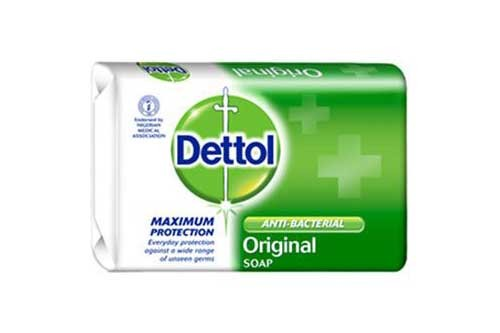In the quest for flawless, healthy skin, we often find ourselves exploring many products, each promising a unique path to a radiant complexion. Amidst all, Dettol, a household name renowned for its antiseptic properties, has sparked intrigue and controversy as a potential skincare solution.
With its unmistakable aroma and long-standing reputation for cleanliness, it's no surprise that people wonder, "Is Dettol good for the skin?" With the assistance of dermatologists and scientific research, we aim to provide a comprehensive answer to the question that has piqued the curiosity of skincare enthusiasts and sceptics alike.
What is Dettol?
Dettol soap is a popular brand of soap produced by Reckitt Benckiser, a multinational consumer goods company. Dettol is well-known for its antiseptic and antibacterial properties, and this reputation extends to its line of soap products. Dettol soap is designed to help cleanse and protect the skin from germs, bacteria, and other pathogens. Now let's take a look at the ingredients that go into making Dettol soap.
What is the pH of Dettol soap?
The pH of Dettol Original typically falls in the slightly alkaline range, around pH 9-10, which is considered appropriate for a cleansing soap. This pH range helps in effectively removing dirt, oils, and impurities from the skin. One of the reasons why this soap is great for the skin.
Is dettol soap antibacterial?
Yes, Dettol soap is known for its antibacterial properties. Dettol soaps contain various antibacterial agents, primarily chloroxylenol (PCMX), which is effective at killing and inhibiting the growth of bacteria on the skin. These antibacterial properties make Dettol soap a popular choice for people who want extra protection against germs and bacteria during their daily cleansing routines.
Is dettol soap good for eczema?
Dettol soap, with its antibacterial properties, may not be the best choice for individuals with eczema. Eczema is a skin condition characterized by inflammation, dryness, and sensitivity of the skin. Using antibacterial soaps like Dettol can be harsh on the skin and may exacerbate eczema symptoms for some people, as these soaps can be drying and potentially irritate sensitive skin.
Is dettol soap good for an oily face?
Dettol soap can be used on an oily face to help remove excess oil and impurities. On the other hand, using Dettol soap too frequently or excessively on your face can be harsh and may lead to dryness or irritation. It's generally recommended to use it no more than once or twice a day.
Does dettol soap clear pimples?
Dettol soap may help in reducing the number of bacteria on the skin's surface, which can be beneficial in managing and preventing some types of acne or pimples.
Pimples can have various underlying causes, including excess oil production, clogged pores, inflammation, and more. Dettol soap may be more effective for certain types of acne, such as those caused by bacterial infections, but it may not address all the factors contributing to pimples.
Is dettol soap good for acne?
Dettol soap is useful in managing acne, especially if the acne is caused or exacerbated by the presence of bacteria. Acne can result from the overgrowth of Propionibacterium acnes (P. acnes) bacteria on the skin, and Dettol soap's ability to reduce bacteria on the skin's surface can help in this regard.
Disadvantages of Dettol Soap
Drying Effect
Dettol soap can be harsh on the skin, particularly if used too frequently or by individuals with sensitive or dry skin. It can strip the skin of its natural oils, leading to dryness and potential irritation.
Not Suitable for All Skin Types
Dettol soap is generally not recommended for people with sensitive or dry skin, as it can exacerbate skin conditions or cause discomfort.
Risk of Overuse
Some people may overuse antibacterial soaps like Dettol, thinking that more is better, which can lead to skin problems and antibiotic resistance.
Potential Allergies
Some individuals may be allergic to certain ingredients in Dettol soap, leading to skin reactions, rashes, or itching.
Not a Comprehensive Acne Solution
While Dettol soap can help with acne caused by bacterial infections, it may not address all the underlying causes of acne, such as excess oil production or clogged pores.
How to know original dettol soap
Inspect the packaging of the soap carefully. Genuine Dettol soap should have well-printed labels with clear and sharp text and graphics. Look for any spelling errors or inconsistencies in the labelling.
Genuine Dettol soap has a distinct and strong antiseptic smell. If the soap has an unusual or different scent, it may not be authentic.
Examine the barcode on the packaging. You can verify the product's authenticity by scanning the barcode with a trusted barcode scanner app or contacting the manufacturer to confirm if it matches their product database.
So, is dettol good for the skin?
Dettol soap can be beneficial for the skin in certain circumstances. Its antibacterial properties make it effective in cleaning the skin and potentially reducing the risk of bacterial infections. However, it's essential to use it with caution and moderation. If you have normal to oily skin and are looking for a soap to help cleanse and disinfect, Dettol soap can be a suitable choice. Remember to follow up with a moisturiser to prevent excessive dryness. However, for individuals with sensitive or dry skin or those with specific skin conditions, it's advisable to explore gentler skincare alternatives.


Share:
12 Health benefits of pumpkin leaves
Is groundnut oil good for your health?
1 comentario
Dettol soap is an excellent option for keeping skin free from bacteria, but moderation is key. Overuse can lead to dryness, especially for sensitive skin. A thoughtful skincare routine, with products suited to your skin type, is vital for healthy skin. For more insights into skin health, explore trusted resources!